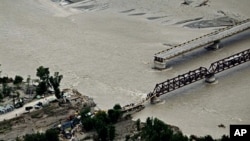After more than two weeks of non-stop torrential rains and devastating floods in Pakistan, one of the hardest hit areas is Swat Valley, often called Pakistan's Switzerland for its stunning mountainous terrain.
The people of Swat Valley, tucked in Pakistan's northwest Khyber-Pakhtunkhwa province, have faced one crisis after another during the last several years: an earthquake in 2005 and a violent movement of Islamic extremists followed by a military crackdown last year. And, now deadly flooding, the worst Pakistan has experienced in more than 80 years.
Thousands of homes have been destroyed and the Valley has, at times, been so cut off due to ongoing bad weather that helicopters have been unable to reach the homeless. Among the international agencies trying to bring basic humanitarian relief to Swat Valley is the British-based international charity Oxfam. Describing the floods as "the biggest disaster in the world right now," Oxfam is attempting to prick the world's conscience into sending more money to help an estimated 14 million affected people.
But the money has been slow in coming, said Jane Cocking, Oxfam's humanitarian director who is in the Valley's main town of Mingora. "We've been looking into just the amount of money submitted by government to the aid efforts here and it is significantly lower than it has been in other crises. It is a very difficult one, it's a very complicated one and it's spread over a huge geographical area and so that might be causing some of the problems. Undoubtedly the response has been slower," said Cocking.
Despite the lack of immediate assistance, Cocking has witnessed the hardiness of the people who live in Swat.
"I'm always absolutely stunned by people's resilience. The people we have been with this morning are about 50 kilometers up the Valley, where the road has been completely washed away and so they are having to walk down from their villages in the mountains to collect whatever they can," Cocking said. "We were talking to old men, women, children who had walked two days from villages to collect one bag of food, which they were going to take back with them. What we're looking at is thousands of people who just have no access to fresh water and food that they really desperately need."
Cocking said what people in Swat need most of all are the basics of life: shelter for those who have lost their homes, clean water and medical attention. For the other areas that have been drenched, parts of central Punjab province and more recently, southern Sindh province, Oxfam's Cocking said the most urgent need right now is cash.
"So that their own governments, so that the international organizations, the United Nations, can get on with the job of helping them get hold of the absolute basics of life in the next few days and weeks. And then, looking forward we need a lot of help to help people rebuild their lives," said Cocking.
Marveling at the resilience of Pakistanis, she said, "A lot of these people who have really had a terrible time over the past few years. And they really are coping absolutely amazingly with it."
[VOA's Sarah Williams contributed to this report]




